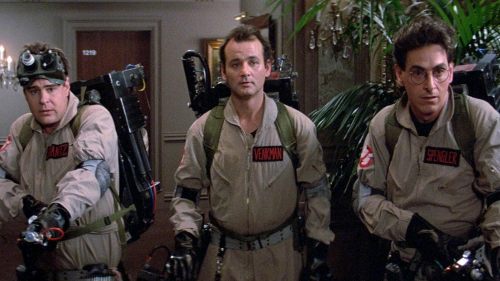Collins’ Crypt: Who Cares If A Movie “Flops”?
About six weeks ago, BoxOfficeMojo completely overhauled their website and locked most features behind a paywall (encouraging you to pay for an IMDB pro account), and the response was universally negative. Ever since, just about every tweet they send out is met with "this design is terrible, please go back to the old way" kind of replies, while their traffic continues to plummet - there seems to be none of the usual "I hate the new design but after a few days I got used to it" kind of sentiment. Another site, The Numbers, has taken advantage of the opportunity and have been making changes to be more usable and offer the kind of information (such as a particular actor or director's individual grosses) BOM wants you to pay for now. It's long been my belief that forcing readers to pay for a feature that's been free for literal decades (the site was founded in 1999) is never a smart decision, but let's assume they know what they're doing.
There has been one positive outcome, however: without the ability to lazily scroll around the site for a while (as every other thing I click on asks for some money), I simply stopped going to the site, and within a few weeks, I stopped caring about specific box office info all together. Beyond a cursory check to see how new releases I care about performed (yay for Knives Out!), I've shed myself of my previous "dedication" to these stats; without a site redesign I'd probably be procrastinating at my desk by comparing Frozen II's performance to the original, but instead I actually don't even know how much it's made so far (I assume somewhere in the vicinity of "a lot"). I found other, more productive things to do with my time, and it was shockingly effortless to stop finding these things as interesting as I once did. Especially when I'd have to pay for it; it's one thing to click around and find a few minor amusing factoids when it's not costing me anything but time - actually *paying* to fill my brain with useless knowledge like this is just absurd.
However, BOM's terrible design decisions can't take all of the credit - John Carpenter and Kurt Russell deserve some of it as well. Last week I received the new Scream Factory Blu-ray of Big Trouble in Little China, marveling at how many new bonus features it had, since it had already been released on a pretty thorough special edition Blu-ray in the past, itself an upgrade from an existing DVD two-disc set we all paid quite handsomely for in 2001. It's a great set I can happily add to my BTILC collection, which currently includes a lavish coffee table book, a board game, several comic books, and (duh) the soundtrack, while thinking about how it was the first time I've watched it at home in years since there have been quite a few big screenings here, including one with Russell himself giving Q&A. A remake has been in development for ages, something the film's numerous fans have publicly decried, but the studio keeps spending more money on development because they're so sure of the brand.

To a younger fan, all of these things might seem like no-brainers: it's a great, fun movie, so naturally it'll lend itself to being exploited with merchandise and cashing in on the name brand, right? Well, that line of thinking would be unfathomable to anyone working at Fox in the summer of 1986, when the film completely flopped upon release despite excellent audience scores and rave reviews. On the commentary track with Russell and Carpenter, the former notes that several journalists began their junket interviews with him asking what it was like to know he was starring in what would be the year's biggest movie - that's how surefire a hit it was going to be. Instead, it landed in 71st place for the year, which embarrassingly puts it below notorious box office misfires like Howard the Duck and Legend.
This is a common occurrence for Carpenter - The Thing, Assault on Precinct 13, and In The Mouth of Madness all tanked as well, but over time have been frequently cited among his best work and (in Thing's case) also a goldmine for merchandising and remake rights. Sure, the failure probably stings at the time and maybe has some repercussions (Carpenter was slated to direct Firestarter for Universal as well, but he was replaced after Thing's failure*), but over time the box office doesn't really matter to you or me, the fans who love it and will happily fork over our money for new special editions, or toys, or whatever else they come out with because they know there's an audience who will eat it up. I don't go a single Halloween without seeing someone dressed as Jack Burton, so who cares if the movie failed to sell as many tickets as House or Critters? No one's dressing as those films' heroes or quoting them endlessly.
And this is hardly the only genre film from the recent past that has endured and found its way into the hearts of fans who weren't even alive when it was released, let alone aware of its box office misfortunes. In the past few months alone, Scream Factory has released things like The Blob '88, Night of the Creeps, and The Fan to disc - all movies that lost money theatrically, yet have enough fans to make them worthwhile endeavors for the outfit. And they don't have a lock on such titles; Arrow put out Hills Have Eyes 2, Synapse did limited and regular editions of Popcorn, etc. Do the box office fates of these movies really matter, when they're being given the same lavish treatment as the big guns like Creepshow and the Dawn of the Dead remake? I think not. The ticket sales become a footnote in their legacy, and merely reinforce the fact that selling lots of tickets doesn't correlate to quality - a quick check of the Planet of the Apes series' grosses can certainly confirm that (guess which one sold the most tickets in the US? Hint: Ape Lincoln).

Plus, with some exceptions, a movie failing to sell millions of tickets today doesn't mean the same thing it used to. A flop used to hurt more, because there weren't as many avenues of recouping that loss, nor was the global market as lucrative; if you lost money on your US release, you'd have to make it up entirely with cable licensing (which would be based on its success; HBO could get the box office disappointments a lot cheaper than the hits, which is why so many people my age saw movies like Big Trouble in Little China seemingly almost daily) and VHS sales. Now we have multiple, more accessible physical formats, streaming, boutique labels like Scream Factory who more often than not are releasing films that have already been put out, etc. And on the other hand, the audience is simply more fractured - beyond the "must-see on the big screen" types like Avengers, it's almost shocking ANY movie can make a lot of money theatrically when they're bombarded with options at home, something that wasn't the case in decades' past, where more often than not the only things you had to watch at home were movies you already saw (i.e. your own collection of VHS tapes) or what happened to be airing exactly at that time on one of your couple dozen (not couple hundred) channels.
It's worth noting as folks fret over the disappointing box office for Doctor Sleep, which hasn't - and won't - even match the non-inflated take of the original Shining, let alone whatever it translates to in today's dollars. It's a solid film that can easily stand alongside Stanley Kubrick's (with the bonus appeal of many critics saying that it actually improved on King's novel this time, a merit few offered Kubrick), but audiences didn't have dozens of other horror options at their immediate disposal in 1980, and so it didn't have as easy of a time selling tickets. Yes, it would have been nice for all involved - especially Mike Flanagan, since his movies rarely play in wide release - that it become a big hit, but will it still hurt five or ten years down the road, when folks are still dressing as Rose the Hat for Halloween, streaming or buying the movie on whatever format we're on by then, and tweeting their admiration for it? Some might say that a film flopping results in others not being made, but let's be real: there will still be King adaptations going long after we're all dead, and last I checked, some of his box office disappointments tend to do all right for themselves in the long run.
Long story short, the only people that really need to know how much a random movie made on a Tuesday vs how much it made the previous Tuesday are the executives at whatever studio released it. People tend to bounce back more often than not; take Big Trouble for example: Carpenter had a #1 movie two years later (They Live) and Russell's next two films (Overboard and Tequila Sunrise) were among his highest grossers at the time. So I say, let's leave box office minutiae to people whose jobs actually rely on that level of nitty-gritty, while we just spend that time with the movie itself. Take it from a recently reformed addict on the topic - it's a far better use of your time.
*He made Christine instead, which netted better reviews and - natch - more ticket sales than Firestarter did anyway.



